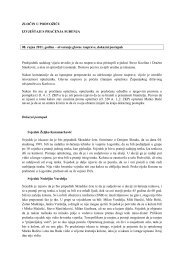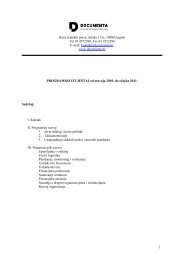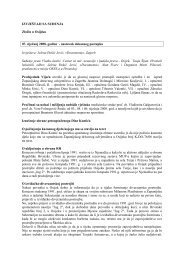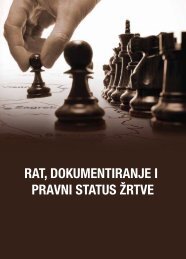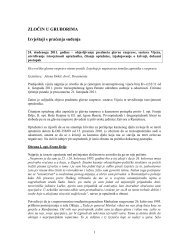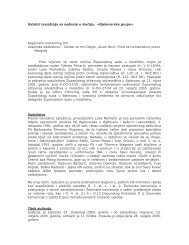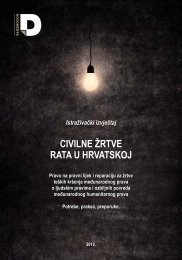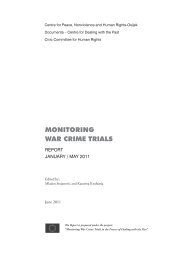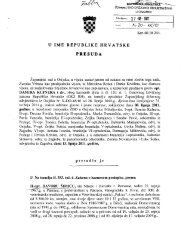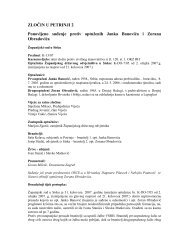Preuzmi u pdf formatu - Documenta
Preuzmi u pdf formatu - Documenta
Preuzmi u pdf formatu - Documenta
- No tags were found...
Create successful ePaper yourself
Turn your PDF publications into a flip-book with our unique Google optimized e-Paper software.
Reasons for publishing<br />
THE SUPPLEMENT TO TEXTBOOKS OF CURRENT CROATIAN HISTORY<br />
The editorial board of <strong>Documenta</strong> — Center for dealing with the past<br />
The Supplement to Textbooks of Current Croatian History is a handbook for history lectures, which was ordered by<br />
the Croatian Ministry of Science, Education, and Sports after the five-year moratorium on teaching current history<br />
in the Podunavlje region expired in the 2002/2003 school year. This easternmost region of Croatia remained under<br />
the control of local Serbs after the end of the 1991-1995 conflict, and was returned to Croatian sovereignty in 1998<br />
after a transitory period under UN administration and the signing of an agreement between the Croatian government<br />
and the local Serb population. Part of the agreement included the decision that instruction in Podunavlje<br />
for Croat and Serb children would take place in separate classrooms, and that a five-year moratorium on teaching<br />
contemporary Croatian history in classes taught in the Serbian language would be imposed.<br />
At the end of 2002, the Ministry, headed by Minister Vladimir Strugar, in cooperation with the representatives<br />
of the Serb community and several history teachers, decided to form the „Commission for developing proposals<br />
regarding the teaching of history of the former Yugoslavia since 1989 in the schools of the Croatian Podunavlje,“<br />
as well as produce a handbook which would cover the period of contemporary Croatian history after 1989. It was<br />
concluded that the handbook needed to function as an appendix for existing textbooks, and that it would serve<br />
as the first step in eliminating the moratorium and as a temporary solution until new textbooks could be chosen<br />
that would be translated into the Serbian language and script.<br />
After failing to find a publishing company to produce the handbook during 2003, work continued in the fall of 2004,<br />
under Minister Dragan Primorac. The Commission chose Tvrtko Jakovina and Snježana Koren from the Department<br />
of History at the Philosophy Faculty, University of Zagreb, as well as Magdalena Najbar-Agičić, the author and<br />
editor of a number of elementary and high school history textbooks, to complete the handbook.<br />
The authors finished the handbook in April 2005. In the meantime, the Commission decided that the text would<br />
not only serve the students in Podunavlje, but other students across all of Croatia as additional material for<br />
studying contemporary history. Once the work was completed, the manuscript was given to reviewers who needed<br />
to evaluate the quality of the methodology as well as the historical content of the material. However, before the<br />
reviews — some of which were subsequently shown to be very positive while others were extremely negative —<br />
reached the authors of the handbook, the content of the negative reviews appeared in the media and sparked<br />
a public debate that lasted for several months. The actual text of the Supplement remained, for the most part,<br />
142



